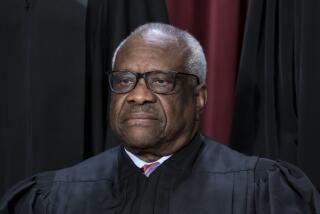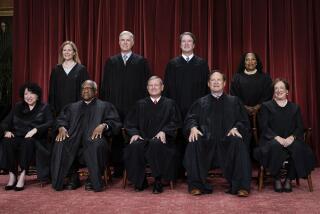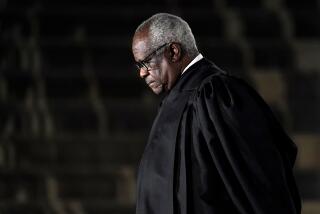Constituents Jam Telephone Lines at Senate Offices : Public: Lawmakers report a sudden rush of calls over the sexual harassment issue. Sen. Seymour is reconsidering support for Thomas, his aide says.
WASHINGTON — Senate offices experienced telephone gridlock Tuesday as constituents called to express their opinions on the sexual harassment issue raised over the weekend in the Clarence Thomas confirmation battle.
At the office of Sen. John Seymour (R-Calif.), for example, aide H. D. Palmer said that the sudden rush of calls had caused the senator to reconsider his support of the Supreme Court nominee--or at least to favor a delay before casting his vote.
For the record:
12:00 a.m. Oct. 10, 1991 For the Record
Los Angeles Times Thursday October 10, 1991 Home Edition Part A Page 3 Column 1 Metro Desk 2 inches; 44 words Type of Material: Correction
Seymour on Thomas--A quotation that was inadvertently cut short in an article in Wednesday’s Times should have gone on to say that Sen. John Seymour (R-Calif.) had not changed his mind on the Clarence Thomas vote, but was considering the matter in light of new allegations and an outpouring of constituent calls.
“There’ve been a lot of news stories and that’s got the people rushing to the phones,” Palmer said, adding that the calls were running 2 to 1 in favor either of a delay in the vote or an outright rejection of the nomination.
“He’s watching how the calls are running and he likes to know what’s on the public’s mind,” Palmer said of Seymour.
Such telephone monitoring was going on across official Washington on Tuesday in the wake of allegations that the Supreme Court nominee had sexually harassed Anita Faye Hill, a woman who had worked for him at the Department of Education and the Equal Employment Opportunity Commission.
The allegations were made public last weekend, only days before the scheduled vote Tuesday on his confirmation by the full Senate. Late Tuesday, the Senate decided to postpone that vote.
While not a scientific measure of public opinion, constituent calls are carefully monitored by lawmakers to assess the mood of the nation on key issues. As the hour for the Senate vote approached Tuesday, lawmakers were carefully tracking calls from their districts in an effort to gauge public sentiment that might affect their votes.
Only at the White House--which has been unwavering in its support of Thomas--did a switchboard operator say that the number of calls was “not unusual.”
At the Washington office of Sen. Richard C. Shelby (D-Ala.), spokeswoman Tricia Primrose said that about 20 calls jangled the nerves of staff members during the day’s first hour.
“The majority of the calls were split 50-50 over the question of delaying the Senate vote; the others were calling it a smear and a small number wanted Sen. Shelby to vote against Judge Thomas,” she said.
By 2 p.m., she said, the calls on the Thomas nomination had jumped to 40, compared to an expected three or four calls a day on any single issue. “This is definitely a significant number,” Primrose said.
By day’s end, the number of calls “picked up considerably,” she said.
Actually, she noted, the calls began on Monday, after the sexual harassment charge became public over the weekend. “For the most part, the callers are in favor of Thomas, splitting about 70% pro, 30% con,” she said. “But we’re very much aware of the fact that more calls are coming in.”
A spokesman for Sen. David L. Boren (D-Okla.) said early Tuesday that the senator’s Washington office had received about 125 calls in the previous 24 hours, with callers advocating a postponement by about a 2-1 margin.
That represented a sudden change of public opinion; earlier callers had been expressing support for Thomas by a 2-1 margin. The difference was Hill’s news conference on Monday, when she alleged on national television that Thomas repeatedly had asked her to go out with him and, when rebuffed, turned the conversation to pornographic films that he had seen.
Dorothy Endacott, a legislative aide to Sen. J. James Exon (D-Neb.), who already had expressed support for a delay in the vote, said that staff members had received about 400 calls to his state and Washington offices by early afternoon, with calls still ringing on the Capitol Hill phones. About two-thirds of his constituents favored Thomas’ confirmation and one-third were against, with many also calling to encourage a delay in the vote, she said.
More to Read
Get the L.A. Times Politics newsletter
Deeply reported insights into legislation, politics and policy from Sacramento, Washington and beyond. In your inbox three times per week.
You may occasionally receive promotional content from the Los Angeles Times.










